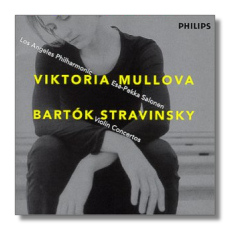
The Internet's Premier Classical Music Source
Related Links
- Latest Reviews
- More Reviews
-
By Composer
-
Collections
DVD & Blu-ray
Books
Concert Reviews
Articles/Interviews
Software
Audio
Search Amazon
Recommended Links
Site News
 CD Review
CD Review
Bartók / Stravinsky

Violin Concertos
- Béla Bartók: Violin Concerto #2 in B minor
- Igor Stravinsky: Violin Concerto in D Major
Viktoria Mullova, violin
Los Angeles Philharmonic Orchestra/Esa Pekka Salonen
Philips 456542-2 DDD 55:42
What is interesting about Mullova here is her opening notes in the Bartók, which have an almost clipped sound. She dives headlong into the main theme on the first two notes, as if determined to bring out the essence of the music, its grit and muscle. Yet, her tone is not as big as Mutter's (DG), though she certainly does project enough power in this somewhat fleet reading. She is not sentimental in the second movement, maintaining a tension and fiery passion in this mysterious, dark music. In the outer movements she plays with commitment and a fine sense for drama and intensity.
If Mullova has a weakness, it's her tendency to sound slightly calculating. The opening of the finale, for instance, sounds a little too mechanical, the contrasts in her dynamics in the theme a bit exaggerated. Still, even this is hardly a problem, since her technical and interpretive skills are in evidence everywhere. When delivering Bartók's more rhythmic music, for example, she is always convincing, even if a bit inelastic. In the end, this is an intense, somewhat driven Bartók Second that will certainly satisfy her fans, as well as those interested in this concerto.
Her Stravinsky fares even better. The brighter music here brings out a more relaxed manner from her, and she misses little of the humor and delights in this work. Once more, Salonen is right on target in his conducting, revealing Stravinsky's scoring for all its subtleties and color. Like the Bartók, this is a leaner performance compared with most other efforts, having a slightly faster overall timing than even the Stern/Stravinsky from four decades ago.
The Los Angeles Philharmonic Orchestra plays splendidly throughout both works and Philips provides vivid sound. Mullova is a violinist in the front rank today, and rarely does she turn in less than a compelling and distinctive performance. This recording is certainly witness to her consistent artistry.
Copyright © 2000, Robert Cummings


















